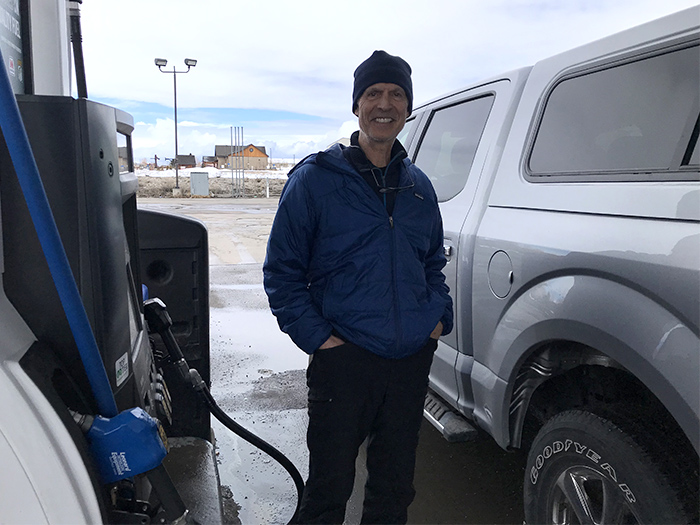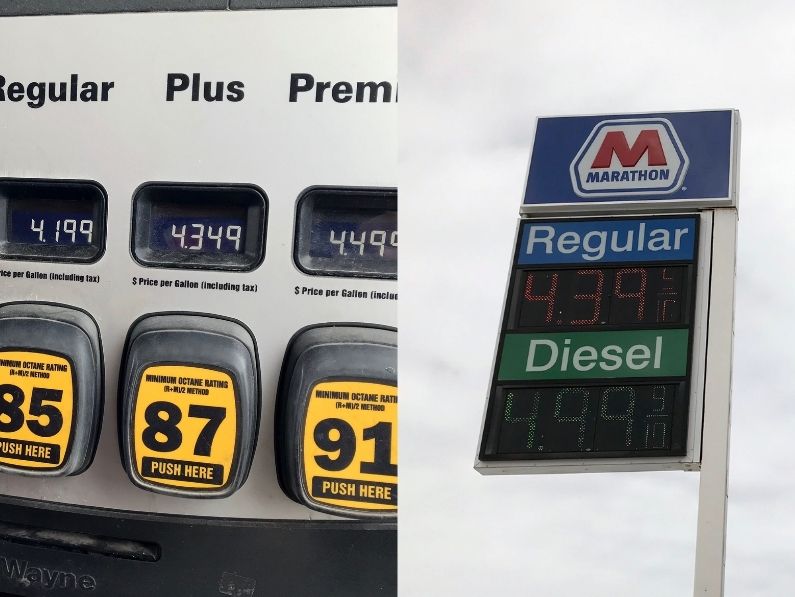Savannah Medina is a mom of seven who lives in Victor, Idaho. She drives a Dodge Durango to accommodate her large family—and it doesn’t exactly get great gas mileage.
“Every time I drive past the gas station and see how much gas prices go up, like literally I want to vomit,” Medina said. “And when I see my tank start to get below like even half-way, it just—the idea of having to put more than $50 worth of gas in at a time, I just want to cry. Straight up hurl or cry. Those are my options.”
Medina also has a closer vantage point to gas prices than most folks because she works part-time at the Marathon gas station just outside of Driggs. And she said she knows prices were already rising well before the war in Ukraine started.
“I don’t correlate the two because, I mean, looking at this time last year, gas was more than $1 less per gallon,” she said. “Even six months ago it was more than $1 less per gallon than it is now.”
It’s true: The national average regular gas price a year ago was about $2.88 per gallon, according to AAA. As of press time, it’s now about $4.24.* And Idaho specifically was among the top 10 states in the country with the biggest jump in prices during the first full week in March.

One of Pat Fortino’s vehicles is a Ford F-150 pickup truck—the most popular car in Idaho, Wyoming and across most of the middle of the country, according to the insurance comparison company Insurify. (Kyle Mackie/KHOL)
“Everybody wants to blame it on Biden, but Biden doesn’t control gas prices—for the people who don’t understand that,” said Pat Fortino, another Victor resident who spoke to KHOL while filling up his Ford F-150 pickup truck. “It has to do with the world oil prices. It’s supply and demand.”
Yes, the world oil market has been shaken by the war. You might have heard President Biden refer to “Putin’s price hike” when talking about gas prices. But according to AAA, the cost of crude oil accounts for about 50% of what drivers pay at the pump. A big piece of the domestic puzzle, analysts conclude, is that American producers are choosing not to boost supply too much, which would flood the market and push prices down.
Brad Handler is a 20-year veteran as a Wall Street equity research analyst in the oil and gas sector. Speaking during a media briefing organized by the nonpartisan conservation organization the Center for Western Priorities in early March, he said investors and creditors pressured American producers to implement more capital discipline coming out of the uncertainty of the COVID-19 pandemic, so they’ve promised not to pursue too much growth.
“What that leaves is this interesting scenario because oil companies are, on the one hand—or at least some of the industry advocates—are saying, ‘We have somehow constrained in what we can do, and the government needs to help us out,’ but in fact the constraints are coming from the investor base themselves, and oil companies are simply responding to that,” Handler said.

Two photos taken one day apart in Jackson, Wyoming, on March 15 (left) and Driggs, Idaho, on March 16 (right) show that the Idaho price is 20 cents higher per gallon for regular gas. (Kyle Mackie/KHOL)
Over the past several weeks, Wyoming Rep. Liz Cheney has repeatedly called for the U.S. to become the “energy arsenal” for the world. She also echoed the argument Handler mentioned in a recent press call with Wyoming reporters.
“The Biden administration policies to shut the Keystone [XL] pipeline, to ban new leases for oil and gas development on public lands—those are bad policies,” Cheney said. “They’re misguided, and they’re certainly bad for Wyoming and they’re bad for the country.”
Those are grievances conservative politicians have expressed from day one of the Biden presidency. But even with such policies in place, 2022 is on track to be a strong year for U.S. oil production, with an all-time-high forecasted for 2023, according to the U.S. Energy Information Administration. The industry is also sitting on a stockpile of unused drilling permits on federal and tribal lands that amounts to an area larger than the size of Kentucky, according to the Center for Western Priorities. Further, reapproving the Keystone pipeline would not provide a short-term fix at the pump.
Autumn Hanna, vice president of the national nonpartisan budget watchdog group Taxpayers for Common Sense, summarized it this way: “The simple truth is that oil and gas companies will say they need more taxpayer subsidies in just about every circumstance, including the current situation in Ukraine.”
Hanna said oil and gas companies are making record profits while gas prices remain high and that most subsidies for the industry are unnecessary yet go unquestioned. Still, the Biden administration is trying to encourage more production both at home and abroad in order to take some of the pressure off of Americans like Medina and Fortino.
“I strategize my errand running more because I’m trying to minimize the miles that I drive [and] the money that I’m spending in my gas tank,” Medina said.
As for Fortino, “I won’t drive this truck very much,” he said. “We bought it to have a trailer but we already sold that in the spring. Before the gas went up, we just decided we didn’t want a trailer. You get 10 miles a gallon with that.”
Instead, Fortino said, he’ll be mostly behind the wheel of his Honda Accord—and that he might drive over to Jackson to get gas, where the prices are normally a little cheaper.
*EDITOR’S NOTE: The average price per gallon of regular gas was $4.29 per gallon, according to AAA, at the time the radio version of this story was produced. This web story has been updated to reflect the average price per gallon as of Tuesday, March 22.






